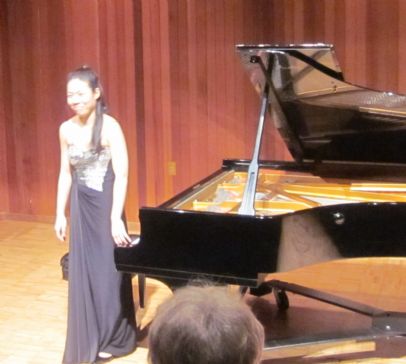|
Symphony
MYSTICAL PLANETS AND LIVELY GERSHWIN ORTIZ AT FINAL SRS CONCERT
by Peter Lert
Sunday, May 4, 2025
Symphony
VSO'S CONCERT MUSIC OF TIME, MUSIC OF PLACE
by Peter Lert
Sunday, April 27, 2025
Choral and Vocal
VOCAL ELEGANCE AND FIRE AT THE 222'S RECITAL APRIL 26
by Pamela Hicks Gailey
Saturday, April 26, 2025
CANTIAMO SONOMA SINGS AN INSPIRED GOOD FRIDAY MOZART REQUIEM CONCERT
by Pamela Hicks Gailey
Friday, April 18, 2025
DRAMATIC SHOSTAKOVICH SYMPHONY CLOSES PHILHARMONIC'S 25TH SEASON
by Terry McNeill
Sunday, April 13, 2025
LARGE COLLEGE OF MARIN AUDIENCE GREETS STOPHER ARTISTRY
by Terry McNeill
Saturday, April 5, 2025
Chamber
FRISSON DELIVERS SHIVERS OF DELIGHT
by Abby Wasserman
Sunday, March 30, 2025
OLD AND MOSTLY NEW IN SRS MARCH CONCERT IN WEILL
by Peter Lert
Saturday, March 22, 2025
Symphony
TWO FORMIDABLE SYMPHONIES AND PURPLE MOUNTAINS AT SRS CONCERT
by Peter Lert
Sunday, February 23, 2025
Chamber
THE PARKER CAPTURES DEMANDING ADES QUARTET AT RAC SEBASTOPOL CONCERT
by Peter Lert
Saturday, February 15, 2025
|
 |
 Pianist Joyce Yang receiving ovation March 16 at SRJC |
MASTERLY RECITAL FROM JOYCE YANG
by Terry McNeill
Friday, March 16, 2012
Pianist Joyce Yang came to her Newman Auditorium recital March 16 with a bevy of extravagant press notices and a contented audience. Why contented before a note was played? The SRJC concert committee provided a lavish reception before, not after, the recital, honoring the annual Randolph Newman recital tradition. So there was a warm and perhaps sedentary glow in the packed hall when Ms Yang stepped to the instrument for the first of four Scarlatti Sonatas.
Each of the Sonatas received an expressive reading, more romantic than classical, with the C Major (K. 132) performed with large dynamic contrasts and alternating clipped phrase endings with extended use of the damper pedal. In the D Minor (K. 9), popular for years in the Tausig version Pastorale and Capriccio, the tempo was deliberate and the articulation clean. In the final two Sonatas, K. 141 and 29, Ms. Yang's exemplary cross-hand technique and ample pedal generated a fleet momentum. Her command of these works was mature and in every way impressive. No repeats were skipped.
Debussy's popular "Estamps" followed with Ms. Yang underscoring the music's atmospheric effects, the shift pedal in constant use and her touch at times heavy, befitting the gong-like bass notes in "Pagodes." Some of these notes were played but didn't sound, at least to my seat in the rear of the hall. Soiree Dans Grenade was fetchingly played, the artist getting habanera effects from the piano with subtle rhythmic variation. The concluding "Jardins sous la Pluie" was played vigorously, the ceaseless triplet 16th notes played with precision. In her spoken remarks Ms. Yang characterized her programs and much of Debussy as a collage, and this performance was a prismatic playing of a masterwork.
Ms. Yang seems to own the Op. 29 Liebermann "Gargoyles," a 1989 four-movement work that appears frequently in piano competitions. She played the opening toccata figurations rapidly and her fluid finger staccato made the digital demands appear easy, as did the following moderato with softly repeated notes in the right hand, richly hued. This movement is reminiscent of the forgotten Walter Niemann’s forgotten Nocturne, shimmering but not note perfect as was nearly the entire recital. The final presto was played with menace and a grand sweep, the big contrary motion skips in both hands accurate and the runs half pedaled.
Anton Rubinstein called Schubert "eternal sunshine in music" and Ms. Yang's lyrical playing of the G-Flat Major Impromptu (Op. 90) had a lovely singing legato line. It began with minimal ritards in the modern vein, then broadened to a line stretching retards at each modulation and thematic entrance. It was a balanced and compelling interpretation.
Concluding the recital were the eight contrasting pieces of Schumann's Op. 12 "Fantasiestücke." Contrast was the operative word and Ms. Yang's consummate pianism captured the composer's illusory and capricious imagination. Especially memorable was how Ms. Yang handled the multiple layers of melodic writing for one hand in the In Der Nacht section, and the control she brought to the explosive Aufschwung.
In response to a vocal ovation the pianist played Earl Wild's transcription of Gershwin's "The Man I Love," originally a song from the 1927 Broadway show Strike Up The Band. Here Ms. Yang brought out delicious counterpoint, swirls of notes and in the final two bars a deft decrescendo in the piano’s high treble. It was an alluring encore that ended a masterly recital.
|

